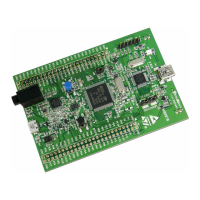DocID026304 Rev 3 7/44
AN4488 Power supplies
43
2 Power supplies
2.1 Introduction
The operating voltage supply (V
DD
) range is 1.8 V to 3.6 V, which can be reduced down to
1.7 V with some restrictions, as detailed in the product datasheets. An embedded regulator
is used to supply the internal 1.2 V digital power.
The real-time clock (RTC) and backup registers can be powered from the V
BAT
voltage
when the main V
DD
supply is powered off.
2.1.1 Independent A/D converter supply and reference voltage
To improve conversion accuracy, the ADC has an independent power supply that can be
filtered separately, and shielded from noise on the PCB.
• the ADC voltage supply input is available on a separate V
DDA
pin
• an isolated supply ground connection is provided on the V
SSA
pin
In all cases, the VSSA pin should be externally connected to same supply ground than
VSS
On packages with 100-pins and above
To ensure a better accuracy on low-voltage inputs, the user can connect a separate external
reference voltage ADC input on V
REF+
. The voltage on V
REF+
may range from (V
DDA
- 1.2 V)
to V
DDA
with a minimum of 1.7 V.
When available (depending on package), V
REF–
must be externally tied to V
SSA
.
On packages with less than 100-pins
The V
REF+
and V
REF-
pins are not available, they are internally connected to the ADC
voltage supply (V
DDA
) and ground (V
SSA
).
2.1.2 Battery backup
To retain the content of the Backup registers when V
DD
is turned off, the V
BAT
pin can be
connected to an optional standby voltage supplied by a battery or another source.
The V
BAT
pin also powers the RTC unit, allowing the RTC to operate even when the main
digital supply (V
DD
) is turned off. The switch to the V
BAT
supply is controlled by the power
down reset (PDR) circuitry embedded in the Reset block.
If no external battery is used in the application, it is highly recommended to connect V
BAT
externally to V
DD
.

